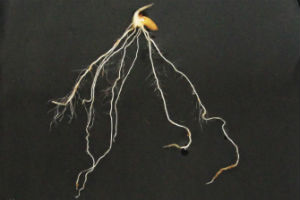 Identification of compartments and flows of available phosphorus regulated by bacterivores in the rice rhizosphere in tropical soils using radio-isotope 33P
Identification of compartments and flows of available phosphorus regulated by bacterivores in the rice rhizosphere in tropical soils using radio-isotope 33P
Meeting the challenges of food security and agricultural production requires an in-depth knowledge of the ecological processes involved in the regulation of biogeochemical cycles of nutrients, in particular phosphorus (P), the main macronutrient limiting the productivity of agrosystems. These processes are mainly undertaken by soil organisms whose activities ensure the functioning of the ecosystems and directly increase the availability of nutrients for plants. The BAC-RIP project sets out to identify and characterise the compartments and available P flows under the regulation of soil bacterivores (protists and nematodes) in the rice rhizosphere (Oryza sativa) grown on a low P tropical soil in Madagascar.
BAC-RIP is an experiment to co-inoculate organisms in rhizoboxes under controlled laboratory conditions together with the use of 33P to monitor P flows in the soil compartments. The experiment covers 3 factors, each with 2 states:
• biological (presence/absence of bacterivores)
• soil (strong or weak P fixing capacity)
• 33P marking (marking bacteria or soil).
Using radioisotope 33P, co-inoculating organisms and two types of soil will determine the mechanisms involved in soil micro-biodiversity to provide available P for plants grown in nutrient poor tropical soils.
PhD thesis of Patricia Ranoasiroa is included in this project.
Aims and research topics
The project sets out to study the following research topics:
- Does the presence of bacterivores within the rice rhizosphere increase the P available for the plants?
- If so, does the rice assimilate more P, stimulating growth?
- What mechanisms, flows and P compartments are involved in the positive effects of bacterivores on available P in the rice rhizosphere?
- What is the role of the physical chemical component of the soil in these interactions between roots, bacteria and bacterivores? Does the P-sorption capacity of the soil influence the effect of bacterivores on the P cycle?
The main aim is to identify and characterise the compartments and available P flows under the regulation of bacterivores in the rhizosphere of rainfed rice on a nutrient poor, tropical ferralitic soil.
Date
Mars 2016 - Mars 2017
Partners
Laboratoire des RadioIsotopes (LRI)
Funding
EC2CO INSU-CNRS
Contact
Jean Trap, Eco&Sols, IRD Montpellier
e-mail :






